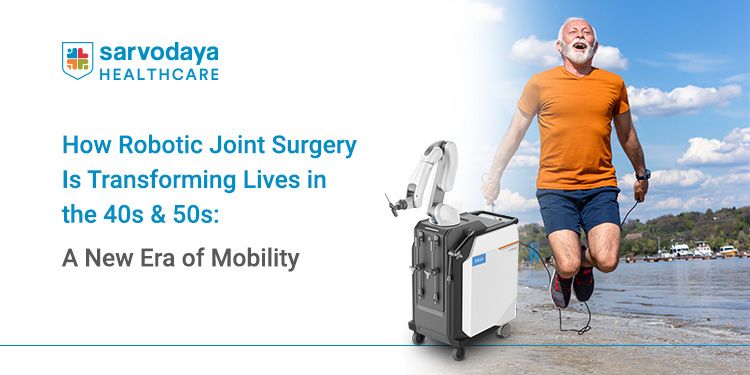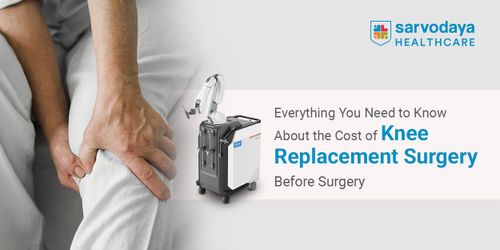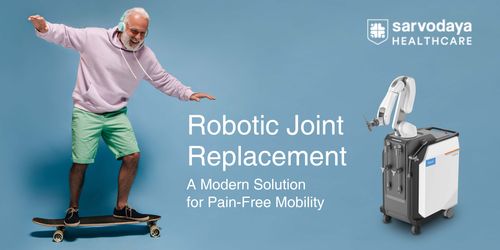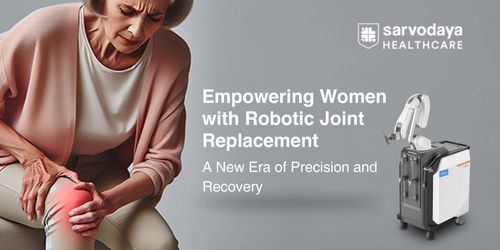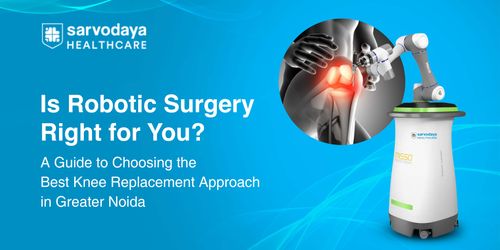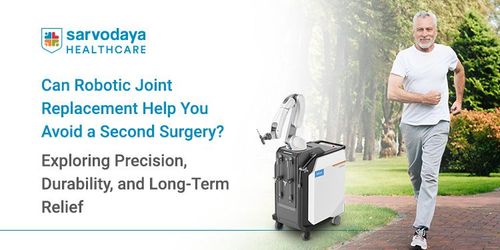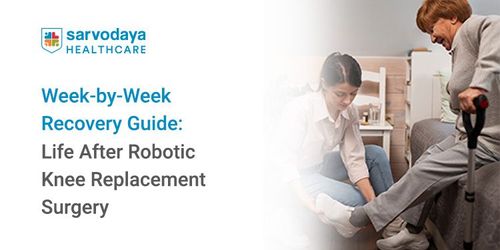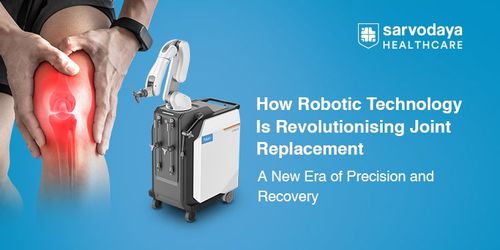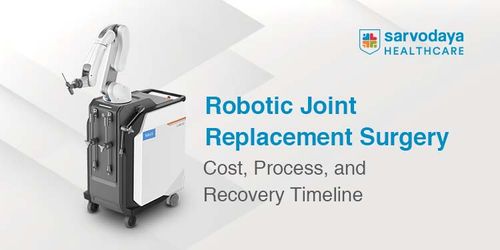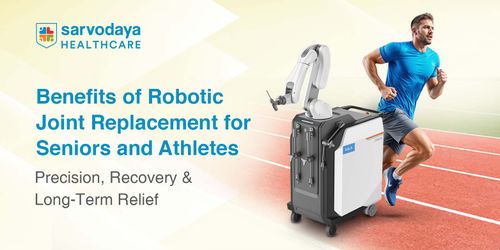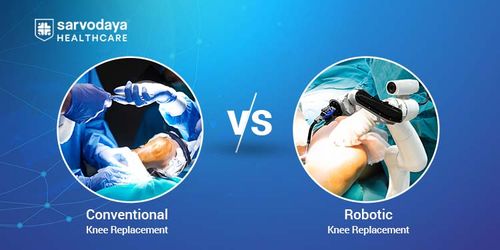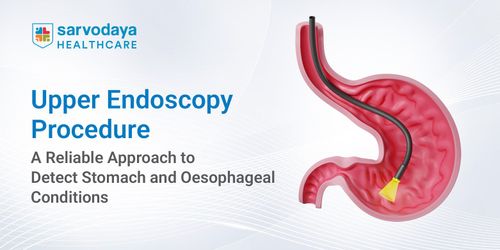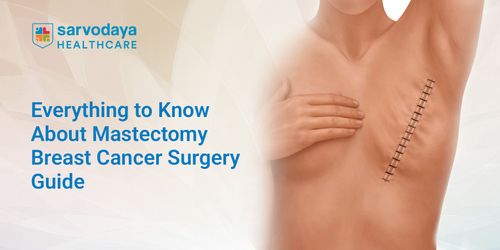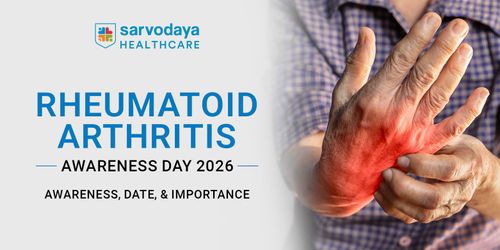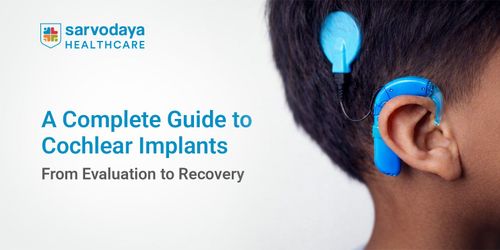Joint pain is no longer an issue restricted to the elderly. Increasingly, people in their 40s and 50s are experiencing discomfort, stiffness, and limitations in movement due to degenerative joint disease or injuries. This discomfort not only disrupts physical mobility but also affects confidence and productivity in professional and social life.
In this blog, we explore how robotic joint surgery is emerging as a game-changing solution for middle-aged individuals.
Understanding Joint Pain in the 40s and 50s
Joint pain is often a result of wear and tear, underlying medical conditions, or past injuries. Unfortunately, this age group often dismisses pain as a temporary inconvenience and avoids consulting specialists until the condition worsens.
Here are some common reasons why individuals in their 40s and 50s suffer from persistent joint pain:
- Early-onset osteoarthritis: This can be triggered by genetics, previous injuries or lifestyle-related factors.
- Inflammatory conditions: Issues like rheumatoid arthritis often begin to show clearer symptoms in this age group.
- Sedentary lifestyle: A lack of physical activity or poor posture can accelerate joint wear and tear.
- Excess body weight: Added weight exerts extra pressure on joints, especially the knees and hips.
Exploring Robotic Joint Surgery
In the field of orthopaedics, robotic joint surgery has introduced a new level of precision and reliability. It is an advanced surgical technique that uses robotic systems to assist the surgeon in performing joint replacement procedures. While the surgeon is still in control, the robot enhances the accuracy of every cut, placement, and alignment of the implant.
Some highlights of how robotic systems assist during surgery include:
- 3D mapping of the joint structure for individualised planning.
- Real-time feedback to the surgeon for optimal positioning of the implant.
- Minimal damage to surrounding tissues due to improved control.
- Consistent joint alignment reduces the chances of revision surgery later.
The Benefits of Robotic Joint Surgery
As medical technology evolves, robotic systems transform outcomes in joint replacement surgeries. For middle-aged individuals seeking relief from chronic pain, the benefits of robotic joint surgery are especially impactful. This technique not only improves the precision of surgery but also enhances the overall recovery experience.
Let’s look at the key benefits patients experience with robotic-assisted procedures:
- Greater surgical accuracy: The robot helps the surgeon perform exact bone cuts, ensuring precise implant positioning.
- Lower risk of complications: With minimal soft tissue damage, there’s less bleeding and reduced post-surgical discomfort.
- Faster recovery: Since the surgery is less invasive, patients often spend fewer days in the hospital and regain mobility sooner
- Enhanced joint function: Better alignment means smoother movement, reduced stiffness, and more natural-feeling joints.
- Long-term satisfaction: More patients report higher levels of post-operative comfort and mobility.
Choosing this advanced approach with guidance from trusted robotic joint replacement surgeons in Delhi NCR, India can set the stage for better long-term health and independence.
Why More Middle-Aged Adults Are Opting for Robotic Knee Surgery
There was once a time when knee replacement was largely reserved for those above 65. Today, however, there is a noticeable shift. More and more individuals in their 40s and 50s are choosing robotic knee surgery due to its advanced capabilities and suitability for their active lifestyles.
Several reasons explain this growing trend. Here’s a breakdown of why this demographic is embracing the change:
- Working after knee surgery: It is a major goal for professionals in their 40s and 50s. Robotic surgery allows a faster return to work due to its minimally invasive nature and shorter recovery period.
- Precision leads to preservation: Since robotic techniques preserve more of the healthy bone and tissue, it’s better suited for younger patients who may need a revision decades later.
- Improved recovery experience: Less pain and quicker rehabilitation make it a preferable choice for those with busy lifestyles.
- Personalised implants: The robotic system helps customise the surgery based on each patient’s anatomy, which is especially beneficial for those still leading a physically demanding or mobile life.
- Higher satisfaction rates: Studies show improved long-term satisfaction among patients who undergo robotic-assisted procedures.
Life After Robotic Knee Replacement
Many patients in their middle years worry about whether they can return to a normal life after joint surgery. The answer is a reassuring yes. Most individuals who undergo robotic knee replacement in Faridabad or other major cities often find themselves more mobile and independent than they were before the surgery.
Recovery and lifestyle improvements look like this:
- Return to work: With proper physiotherapy, many are working after knee surgery within a few weeks.
- Resuming fitness routines: Activities like walking, swimming, and even low-impact sports become possible again.
- Pain-free movement: Patients report major relief from chronic pain that once made daily life difficult.
- Emotional well-being: Increased mobility and independence also boost confidence, reduce anxiety, and improve mental health.
- Active ageing: Patients in their 40s and 50s enjoy an extended period of mobility and functionality, enabling them to live life on their terms.
When combined with expert post-surgical care, the results of knee replacement in middle age can be truly transformative. Choosing an experienced provider, such as a leading robotic joint replacement hospital in Delhi NCR, can make all the difference in how well a patient recovers and reintegrates into daily life.
Conclusion
Joint pain in your 40s and 50s doesn’t have to limit your lifestyle. With innovations in robotic joint surgery, there’s now a safer, more precise, and effective way to regain mobility and return to doing the things you love.
If you are exploring your treatment options, Sarvodaya Hospital, Greater Noida West, stands out as a leading name in robotic-assisted orthopaedic care. With advanced robotic surgery systems, highly qualified orthopaedic specialists, and a patient-first approach, Sarvodaya provides a comprehensive treatment plan, from diagnosis and surgery to rehabilitation. Their personalised care ensures that patients of all ages, particularly those in their 40s and 50s, can resume their lives with confidence and strength.
Book a preventive consultation now to detect early joint issues and provide clarity on whether robotic surgery is the right step for you.


